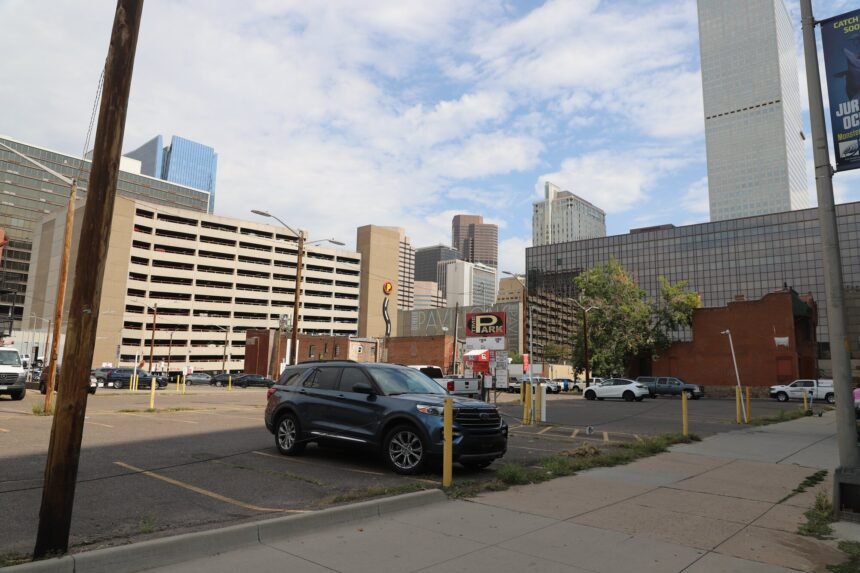Developers are still free to include as much parking as they want — there’s just no longer any minimum requirement imposed by the city.
Ryan Huff, a spokesperson for the city’s Community Planning and Development department, said the city has not received any building permit applications since the law was implemented August 11.
The Populus Hotel, which opened across the street from Civic Center Park October 2024, chose to open without a parking garage or lot, the first Denver hotel to do so.
“The mission of the hotel is to be very environmentally stable,” said Tyler Hartmann, account manager for Propark Mobility, which manages valet parking for guests who drive to the hotel. “One of those things is carbon emissions coming out of the hotel with people driving in from out of state.”
Hartmann said the hotel contracts with Propark valet drivers to bring cars to nearby garages. Expecting people to not bring a car to the hotel at all may not be practical, Hartmann said, but choosing to open without dedicated parking — and using existing lots instead of building new ones — still helps cut down on emissions.
“We wanted to help incorporate biking and public transit as much as possible,” Hartmann said.
Planners in the city’s Community Planning and Development department told council members they likely wouldn’t see changes in parking because developers still want to build what they see as adequate parking.
That argument made council member Amanda Sawyer — one of three “no” votes alongside council members Kevin Flynn and Stacie Gilmore — feel the legislation was performative.
“Developers are already building way more parking than we require them to and that’s how we’ve ended up with all of these empty, ugly parking lots,” Sawyer said. “This isn’t going to solve that problem.”
Sawyer has suggested implementing parking maximums, which would place a cap on parking spaces in new developments. City councils of San Francisco, Seattle, Austin and Portland have all implemented maximums in some form.
In Denver, Sawyer wants developers to build only enough parking for the residents in their buildings or anticipated traffic in their businesses. This would free up space, Sawyer believes, for more green space, housing or patio space in restaurants and bars.
The city took the state’s direction a step further, revoking parking minimums citywide. Colorado’s dictation over home-rule municipalities like Denver – which operates under a charter of its own separate from state law – was a breach of local control, Sawyer said.
“The state overstepped its bounds,” Sawyer said.
The legislation does not affect existing parking lots in Denver. But it’s a step in the right direction against too many empty parking lots around town, said Caroline Leland, who works on housing policy at the Southwest Energy Efficiency Project, which promotes greener energy and access to public transportation in Colorado, Arizona, New Mexico and Utah.
“It’s a huge win for housing, the environment, affordability and other positive outcomes,” Leland said. “I’m excited that the elimination of parking minimums can mean more space for small businesses to open up around the city without them having to pay more to build a parking lot.”
Denver does have too many empty parking lots, Hinds said. He’s not sure if banning parking minimums will solve that problem, but believes it’s a step in the right direction.
“It’s helping us prioritize shelter for people over shelter for cars,” he said. “If the market wants to retain those requirements, that’s fine, but at least we’re out of the business of regulating that.”
“Disabled people are the least-common denominator so if I can get down a sidewalk in my wheelchair, then anyone on foot can as well,” Hinds said. “That should be the standard.”
Denverites are unlikely to notice a difference in the amount of parking a year from now, said David Pardo, an accessory dwelling unit developer.
“The reality is there is a high demand for parking in Denver and I think we should have realistic expectations about what this is actually going to mean,” Pardo said.
However, Pardo expects parking minimums will make the process of building housing easier and more affordable — reasons to support the council’s decision, he added
“If someone is building bare bones studios right next to a train station, they may decide they need to build less parking,” Pardo said. “That could create room for more studios.”
By allowing developers to decide how much parking to include, the city creates more flexibility in housing options, Pardo said.
“Tenants who have e-bikes and rent a car once a year can decide they don’t need the building with parking and save some money that way,” Pardo said. “Businesses who cater to people buying a lot of groceries can decide to build accordingly.”
But The new law implements a one-size-fits-all approach to a large city whose neighborhoods have differing needs, said Kevin Flynn, the Denver City Council member representing District 2, which includes neighborhoods in Southwest Denver bordering Lakewood and Sheridan.
“One of Denver’s strengths is the diversity of our neighborhoods and housing types that work for families, young people and seniors,” Flynn said. “Eliminating parking in one neighborhood might make a lot of sense, but very little sense in another neighborhood.”
Most of Flynn’s district is suburban-style, single-family homes, not high-rise apartments that make up most of Downtown Denver. Developers in his district can still build as much parking as they want.
A presentation August 4 by CPD staff also emphasized that developers would likely continue to build enough parking for tenants and customers, which Flynn said negated the reasoning for passing this ordinance.
“The material we were given was not very persuasive that we needed to do this,” Flynn said.
He added that if developers continue building the amount of parking they choose — regardless of requirements — the law won’t encourage them to prioritize housing over parking.
“Relying on banks and developers leads to problems most of the time” Flynn said.











